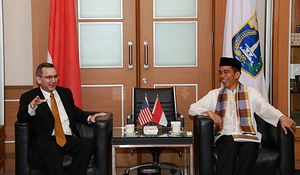Although Indonesian presidential candidate Joko Widodo, or Jokowi, has seen his lead in the polls shrink in the run-up to the July 9 elections, he still remains the overwhelming favorite. Jokowi has lost ground to Prabowo Subianto because of Prabowo’s effective social media and on-the-ground campaign apparatus. Still, Jokowi and his running mate, former vice president Jusuf Kalla, performed well in the first presidential debate, hitting on Prabowo’s highly problematic human rights record and exposing Prabowo’s sharp, even crazy temper. Jokowi seems to have realized that he needs a better get-out-the-vote operation. He also has become more skilled in deflecting concerns that he will just be a tool of his PDI-P party and of party leader Megawati Sukarnoputri.
Still, Jokowi’s true convictions about national-level economic policy and Indonesian foreign policy remain a mystery. In the first presidential debate, he highlighted his famed style of traveling all over Jakarta himself to personally confront bureaucrats and make sure projects are being completed and government workers are not skimming funds. (This style is largely responsible for his man-of-the-people reputation, which is the foundation of Jokowi’s popularity.) But Jokowi has yet to really recognize that, as president, he could not possibly run the massive country simply by personally traveling around Indonesia to hold government workers accountable. In the debate and in campaign appearances, he also has emphasized that although he is just a regular guy, he will hire government officials who are clean and who will use information technology to expedite government functions, improve tax collection, and make government more transparent. If these hires do not perform, Jokowi has promised he will fire all of them.
Although these are fine goals in a country plagued by graft and bureaucratic sloth, and Jokowi has indeed followed through on these goals in Jakarta, he does not seem to realize that just appointing the right people will not strengthen Indonesian institutions, which is critical in an emerging democratic giant. In addition, he does not seem to realize that he could not, as president, just constantly sack underperforming ministers without making Indonesia seem highly unstable.
In addition, in the debate Jokowi touched on several vague ideas for greater economic nationalism, but did not explore them in detail. In fact, he has generally avoided giving any thoughts on how Indonesia’s economy should develop, other than referring to his small business background to reassure businesspeople that he understands their needs. (Jokowi also has not released a list of high-profile economic advisers who could conceivably become ministers in his government.) But making and exporting furniture, which was Jokowi’s business, is a long way from understanding macroeconomic policy and the needs of Indonesia’s biggest companies. By contrast, Prabowo has offered very specific details of his (nationalist) economic policies – policies that I believe would be disastrous for Indonesia’s economy, but nonetheless are detailed.
On foreign policy, Jokowi has been even more vague, although Indonesia increasingly has returned to its traditional role as the driver of ASEAN policy, and has increasingly weighed in on disputes in the South China Sea.
Joshua Kurlantzick is a fellow for Southeast Asia at the Council on Foreign Relations. He blogs at Asia Unbound, where this piece originally appeared. You can follow him on Twitter: @JoshKurlantzick

































